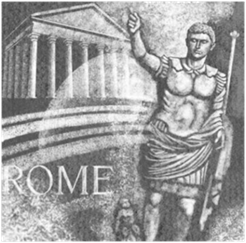
|
THEMATIC INTRODUCTION |
|
Dave DeVoll Editor-in-Chief Truth Matters
|
|
The Truth about the King’s Colony
In 1989 a book appeared in the Christian community called Resident Aliens, written by two scholars—Stanley Hauerwas and William H. Willimon. If you have not read it, I suggest you get it! Although it appeared 23 years ago, it is more relevant today than it was then. These two respected writers wrote a book that is classified under the ISBN number as:
“1. Christianity and culture. 2. Christian life—Methodist authors. 3. Christianity—United States—Controversial literature. 4. Christianity—20thcentury—Con-troversial literature.” What struck me was the label (used twice, no less), “Controversial literature.”
The book is simply a working out of the concept Paul expressed in Philippians 2:5-11; 3:20-21. In that text the apostle told Christians that we are to have the mind of Christ, which he said was one of humility and service and suffering. As an illustration, Paul said, “Our commonwealth is in heaven.” Moffat translated this as, “We are a colony of heaven.”
This would have meant more to the Philippians than it does to us, because that city was a colony of Rome. This made the citizens of Philippi citizens of Rome. As such, they had privileges and responsibilities that other Greek cities without the status of colony did not have. As a colony of Rome, it was to be a miniature Rome. As Hauerwas and Willimon note, “A colony is a beachhead, an outpost, an island in the middle of another, a place where the values of home are reiterated and passed on to the young, a place where the distinctive language and life-style of the resident aliens are lovingly nurtured and reinforced.”
As a “miniature Rome,” Philippi used the Roman language—Latin. Originally the citizens here came from Rome: Many were retired soldiers and their families transplanted here to remind the native residents that another power other than the native power held the real authority. They used Roman coinage as their currency. They had an altar erected to the emperor in Rome where they burned incense as to a god and where they proclaimed as a civic duty, “Caesar is lord.” Their city officials were called by the same titles as the city officials in Rome. Vincent observes, “The figure would be naturally suggested to Paul by his residence in Rome, and would appeal to the Philippians as a Roman colony, which was a reproduction of the parent commonwealth on a smaller scale.”
The historian Will Durant tells us concerning the Roman colonies, “These colonies served many purposes: they . . . acted as garrisons of loyal nuclei amid disaffected subjects, provided outposts and outlets for Roman trade . . . [and] were completed with the plow.”
In the light of this, it seems strange to me that such a subject would be called, in Christian circles, anyway, “controversial literature.” But, as the authors of this book note, “Perhaps it sounds a bit overly dramatic to describe the actual churches you know as colonies in the middle of an alien culture.” The American church seems intent on making our holy religion as much like the culture in which we live as we can. We compete with the entertainment industry, trying to make our “worship” as much like rock concerts or theatrical productions as we can. We conduct our “ministries” in the same ways that our capitalist culture conducts its business. We use the political world as a pattern for congregational and church life.
The liberal theologians of the Eighteenth, Nineteenth, and Twentieth centuries were intent on making the Christian message and life acceptable and respectable to the “modernism” that swept academia in those centuries, beginning in the German universities. Christianity’s holy writings had to be made compatible to Darwinian science. We saw the ultimate expression of that when Germany’s theologians sold out to the Nazi philosophy of the German “superman” ideology.
Today’s theologians seem intent on making the Christian message and lifestyle respectable to the “postmodernism” that is sweeping academia, politics, the arts, and the entertainment world. Absolute truth has been abandoned. Absolute morality has been abandoned. Absolute authority has been abandoned. And it is done all in the name of reaching and communicating to our generation. Whenever the church, however, tries to be like the culture around it, it ceases to be a colony of heaven and becomes just a part of the world. This was the tragedy of Constantine’s “conversion”: the church became nothing more than a vehicle by which to spread the Roman Empire. Indeed, the church became “the Holy Roman Empire” and lost its holiness as it adopted the organization and trappings of the world around it.
Think for a moment of our most recent national experience of being a colony. When the early settlers from Great Britain came to the wilds of North America, they did not adopt the language, customs, habits, currency, weights and measures, laws, institutions, religions or lifestyles of the Native American peoples they found here. They brought with them their own, and they brought with them their own loyalties to the mother country—Great Britain. How long would our forefathers have lasted as a separate, unique people if they had abandoned all that and adopted all the native language, laws, institutions, and religion? Not long at all, I imagine.
|
